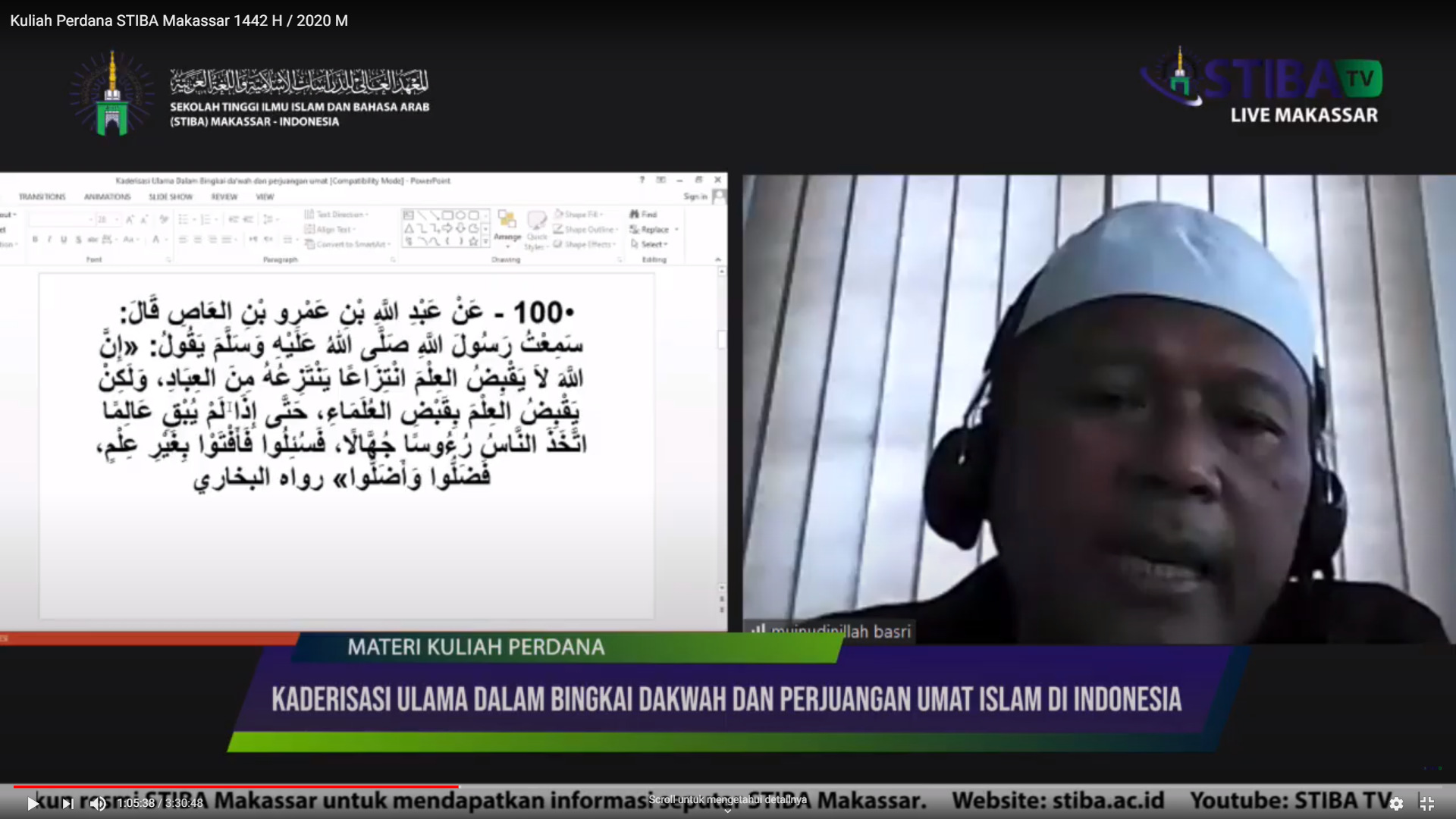(STIBA.ac.id) Makassar – The regeneration of scholars is an obligation that is carried on the shoulders of the Muslims. The struggle for da’wah will not achieve results without the regeneration of scholars. Even though in his hadith, the Prophet, sallallaahu ‘alaihi wasallam, has reported that at the end of time the rabbani scholars were passed away and ignorant people spoke up in place of the scholars, this does not mean that we allow the disappearance of the scholars and be replaced by incapacitated people.
Based on this, the role of scholar regeneration is considered very urgent and, even, obligatory. However, what kind of scholar whose existence is important to maintain, and to be increased in terms of their quantity and quality? Dr. Ustaz H. Mu’inudinillah Basri, Lc., M.A. describes some of the criteria for scholars who should be born from the regeneration process. He explained this when he was a resource person in the STIBA Makassar Initial Lecture which took place online via the STIBA TV Youtube Channel and Zoom media, Monday (07/09/2020).
According to Ustaz Mu’inudinillah, the scholars who are expected to be born from the regeneration of scholars are those who inherit the prophethood. While the prophets received the revelations and set examples, the scholars are those who practiced the revelations.
The scholars are the heirs of the prophet. They inherit knowledge. If the Children of Israel is led by the prophets, the Muslims will be led by the scholars because there will be no more prophets after the Prophet Muhammad, sallallaahu ‘alaihi wasallam. And of course, the Qur’an and the Sunnah inherited from the Messenger of Allah have a concept in developing a country, including Indonesia, and removing it from the mess.
Scholars who can become leaders and advisers of the people are also one of the criteria for scholars who should be born from regeneration according to this MIUMI initiator. He quoted the words of Allah Subhanahu wa Ta’ala,
مَن يَهْدِ اللَّهُ فَهُوَ الْمُهْتَدِ وَمَن يُضْلِلْ فَلَن تَجِدَ لَهُ وَلِيّاً مُّرْشِد;اً
“Whoever is instructed by Allah, then he is the one who gets guidance;
and whosoever He leads astray, then you will not find a leader who can guide him.”
(Surah Al-Kahfi: 17).
“It can be understood from this verse that people are misled because there are no “guardians” who become the adviser for them,” he said.
Therefore, the presence of scholars is very important to guide and educate the people. The piety of the people is achieved by the existence of scholars who transfer the faith, not just knowledge.
The next criterion presented by the Chairperson of the Surakarta City Sharia Council regards of the scholars who are able to provide solutions for social problems. He then gave an example, when the Prophet sallallaahu ‘alaihi wasallam was sleeping, he heard a noise from outside. It turned out that the noise came from an argument between two people; one was in debt and the other collecting what was owed. So, the Messenger of Allah, sallallaahu ‘alaihi wasallam, cancelled half of the debt and the other half was paid by the one who was in debt.
A scholar must have the ability to unite the Islamic movement, be able to motivate the Islamic people to contribute in problem solving.
Scholars who can unite the Islamic people are the next criteria for scholars who should be born from the process of scholar regeneration. This refers to how the scholars improve the scattered people into one compassionate entity.
The last criterion mentioned by the Chairman of MIUMI Solo is the civilization-building scholars. A scholar must build civilization. He gave an example of a very basic change in the perspective of the Muslim community in Surakarta after the birth of the Surakarta City Sharia Council he led. From what used to be mutually exclusive to each other become united.
The Initial Lecture of STIBA Makassar for Academic Year 1441-1442 H / 2020-2021 AD carries the theme “Cadre of Scholars in the Frame of Da’wah and the Struggle of Muslims in Indonesia”. This inaugural lecture took place online and was attended by more than a thousand students, lecturers and administrators. The brothers watched it on Zoom media while the sisters participated via STIBA TV Youtube channel.
Translator: A. Alif A. Hamzah
Editor : Suryadin Abdillah

Leave a Reply